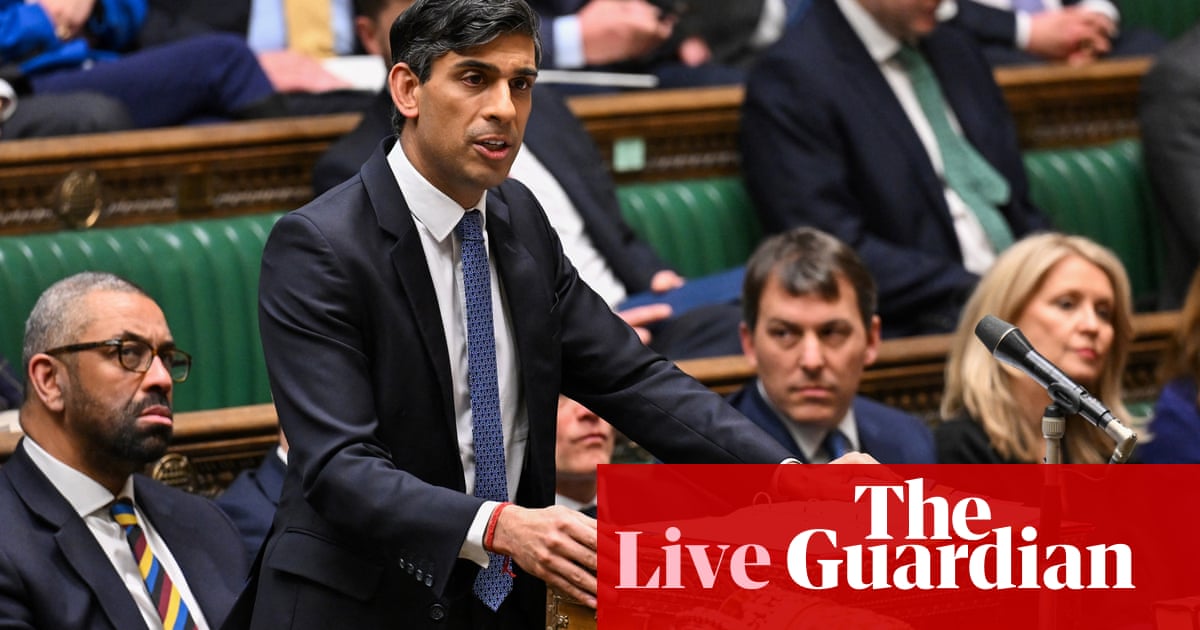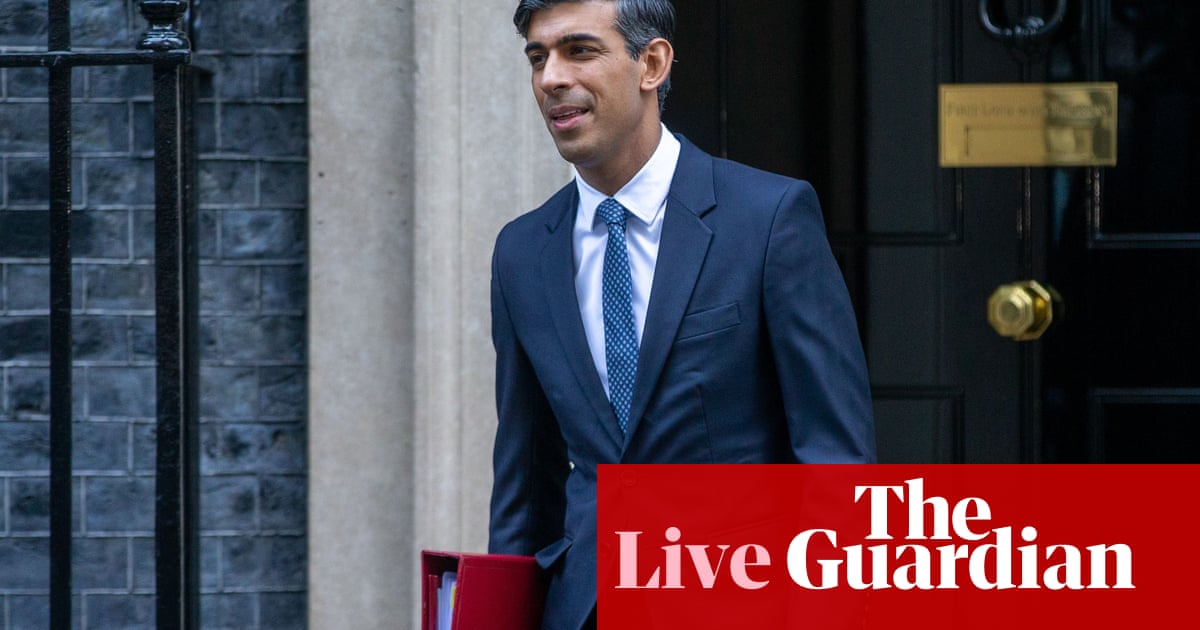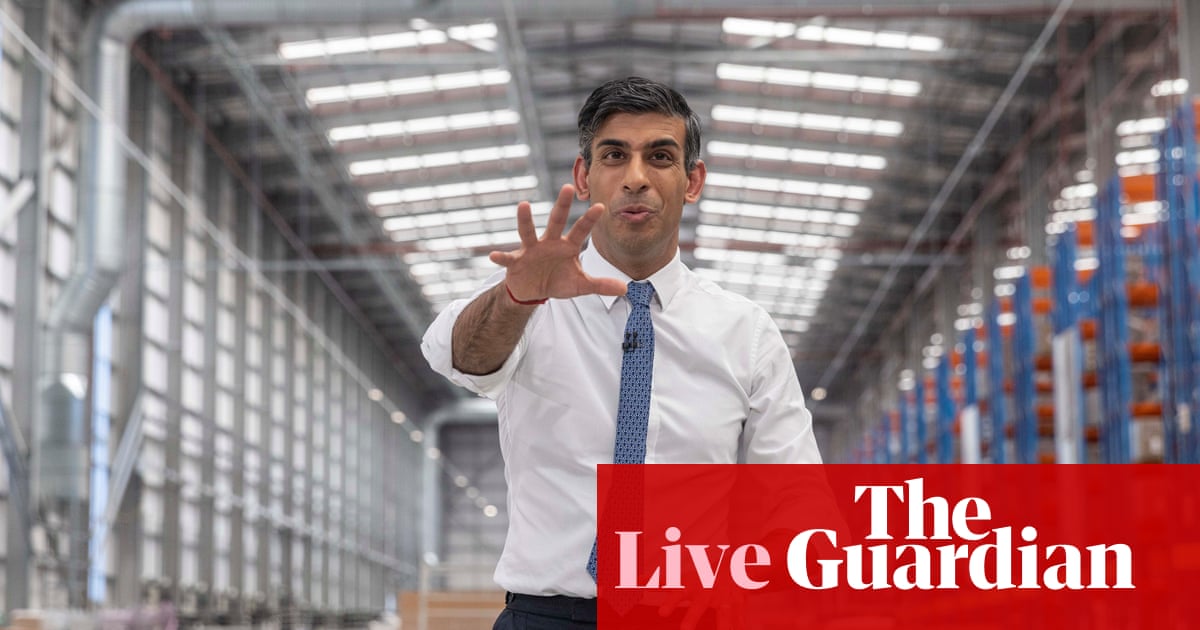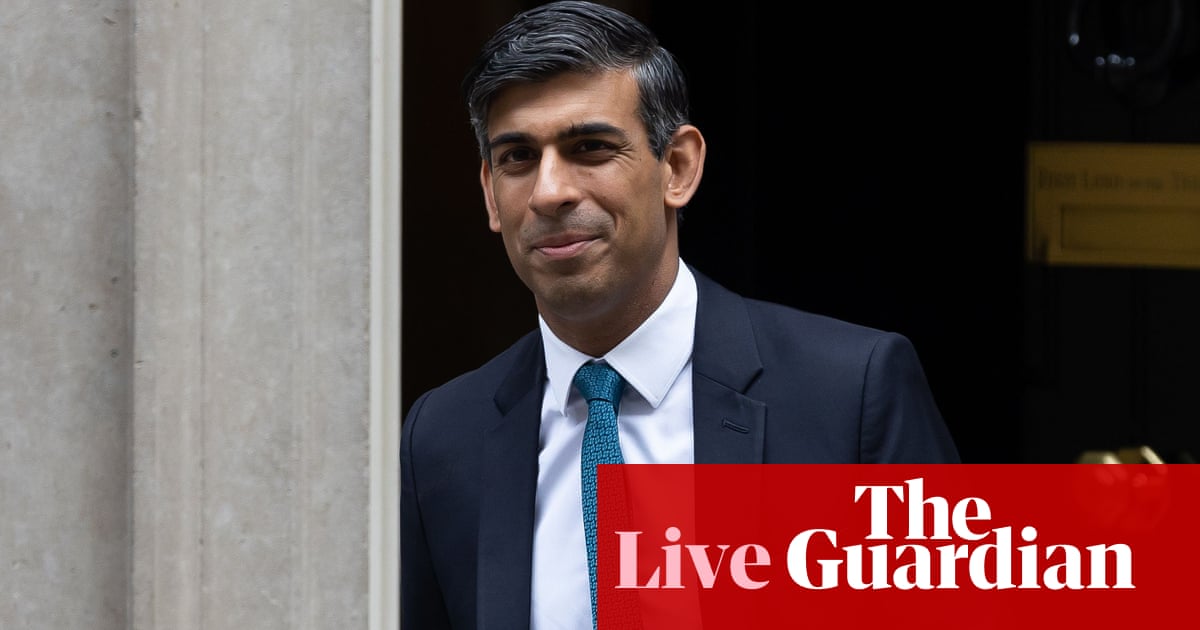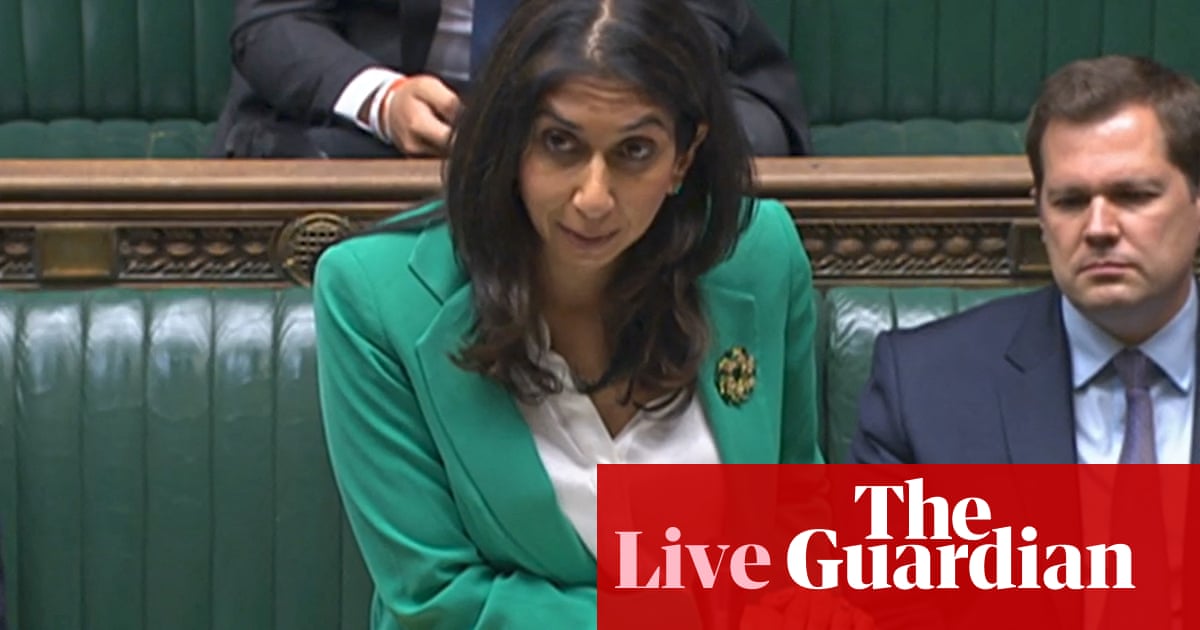
Braverman says police should be firmer with protesters, saying their definition of "serious disruption" might be too narrow
Suella Braverman gave a speech to the National Police Chiefs Council conference earlier. Here are the top lines.
Braverman said she wanted police officers to have more confidence to tackle dispruptive protesters robustly. She said:
Although most police officers do an excellent job, sadly, in recent months and years we have seen an erosion of confidence in the police to take action against the radicals, the road-blockers, the vandals, the militants and the extremists.
But we have also seen the police appear to lose confidence in themselves - in yourselves, in your authority, in your power - an institutional reluctance. This must change.
Criminal damage, obstructing the highway, public nuisance - none of it should be humoured. It is not a human right to vandalise a work of art. It is not a civil liberty to stop ambulances getting to the sick and injured.
Such disruption is a threat to our way of life. It does not ‘further a cause’. It is not ‘freedom of expression’ and I want to reassure you that you have my - and this government’s - full backing in taking a firmer line to safeguard public order. Indeed, that is your duty.
Scenes of members of the public taking the law into their own hands are a sign of a loss of confidence and I urge you all to step up to your public duties in policing protests.
She said she was concerned that police were applying too narrow a definition of “serious disruption” when applying the law. Speaking to reporters after her speech, she said:
I’ve got some concerns about the interpretation of serious disruption and when that threshold is hit, and also the cumulative impact.
So when we see a daily reset do you assess it cumulatively over a 10-day period or week or do you say, well I’m just measuring it in a 24 hour period?
I think police forces and chiefs would welcome clarity on the law and what their powers actually are.
She said she wanted officers to focus on “common sense policing”. She praised the chief constable of Greater Manchester police, Stephen Watson, saying he “rejects woke policing”. And she said:
The way to ensure public confidence in the police is to focus on getting the basics right. What I call ‘common sense policing’. The kind of policing the law-abiding majority deserves and expects.
No politically correct distractions, just good old-fashioned policing - with a relentless focus on making our streets, homes and transport networks safer.
She said she had asked officials to revisit rules on “non-crime hate incidents”, because she wanted officers to focus on serious crimes, such as “threats to people and their property”.
She said she wanted to make crime recording requirements less burdensome. She said:
I am concerned that crime recording requirements can be seen as too complex and burdensome. I am committed to working with the police to see how recording can be simplified without compromising on putting victims first.
She said she wanted the police and the NHS to provide better help to people experiencing acute mental health distress “so that people in need of medical help get the right care at the right time, while also reducing inappropriate demand on policing”.
She said she wanted to create a new, non-graduate entry into policing.
Afternoon summary
Rishi Sunak proved unable to stand up to “a cartoon bully with a pet spider”, Keir Starmer said during PMQs, as he focused on the departure of Gavin Williamson from the cabinet and castigated the prime minister for being weak and lacking principle.
Elections for the Northern Ireland Stormont assembly could be delayed until next April to give talks between the UK and the EU on post-Brexit trade arrangements a chance, the government has announced.
Nurses have voted to stage strikes across the UK for the first time in their history in pursuit of a better pay deal, in a move that will seriously disrupt NHS care.
Labour will soon be defending another seat in a byelection after the MP Kate Green was announced as Andy Burnham’s choice for deputy mayor of Greater Manchester.
Rishi Sunak says the UK will “never back down” when it comes to supporting Ukraine.
Matt Hancock covered with bugs and sludge in I’m a Celebrity preview
A preview of I’m a Celebrity shows Matt Hancock crawling through dark tunnels, showered with bugs and wading through sludge, my colleague Rachel Hall reports.
Harriett Baldwin elected as new chair of Commons Treasury committee
Harriett Baldwin, a former Treasury minister, has been elected as chair of the Commons Treasury committee. She will replace Mel Stride, who was made work and pensions secretary in Rishi Sunak’s first reshuffle, and she secured the post after beating four other Conservatives: John Baron, Richard Fuller, Andrea Leadsom and Kit Malthouse.
In her election statement, Baldwin said she had been a member of the committee since 2019. She went on:
The Treasury select committee needs a wise, knowledgable chair to lead proceedings and I’ve worked closely with our previous chair, Mel Stride, to ensure that the committee challenges witnesses without fear or favour. The committee works best without the shackles of economic ideology and focuses on a strong evidence base to make its recommendations. At a time when the country is looking closely at the way its government manages the economy, all eyes will, too, be on the Treasury select committee to rigorously challenge its thinking.
Government to make changes to bill dealing with legacy of Northern Ireland troubles
The government is set to make changes to a controversial bill to deal with Northern Ireland’s troubled past, PA Media reports. PA says:
The draft legislation would see a form of immunity offered to those suspected of killings during the conflict if they agree to co-operate with a new truth recovery body.
The Northern Ireland troubles (legacy and reconciliation) bill, which is going through its parliamentary stages, would also prohibit future civil cases and inquests related to Troubles crimes.
It has been almost universally opposed by parties across the political divide in Northern Ireland as well as all victims groups.
Northern Ireland secretary Chris Heaton-Harris told the House of Commons today that he would make changes to it but did not specify what the changes would be.
Heaton-Harris said the bill would return to the House in Lords “in a couple of weeks”.
Jens Stoltenberg said he was “absolutely confident” the UK would continue to “lead by example” on defence spending. Speaking after a meeting with Rishi Sunak, the Nato secretary general said:
The United Kingdom has led by example over many years when it comes to … defence spending, spending more than 2% of GDP on defence, the United Kingdom has done that, and now more and more allies are following the example of the United Kingdom.
But, of course, in a more dangerous world we need to invest more in our defence, and I am absolutely confident that the United Kingdom will continue to lead by example on defence spending.
Tom Tugendhat, the security minister, claimed he was holding but “not using” his mobile phone as he pleaded guilty to a driving offence, PA Media reports. PA says:
The Conservative MP for Tonbridge and Malling, 49, is facing a ban from the roads at a court hearing next week after he was stopped by police in his Skoda 4x4 in Wandsworth on April 4.
Tugendhat, who stood for the Tory leadership after Boris Johnson stepped down, previously apologised after he was prosecuted for using a mobile phone while driving.
In a written guilty plea to Bromley magistrates’ court, which heard the case in private under the single justice procedure, the politician said: “I was holding my phone - not using it.
“After the incident I took a course to refresh and correct my driving.
“I have included the result of the course. Please accept the course report.
“I accept my responsibility and recognise my culpability.”
Tugendhat was assessed as “low” risk following his advanced driving course in May, according to the report.
“Thomas does not come across as a fast driver who likes to rush; in fact, Thomas is very calm and handles situations accordingly,” his instructor wrote.
The Metropolitan police sent Tugendhat a conditional offer of a fixed penalty notice in April, and Tugendhat agreed to pay the fine and surrender his driving licence, according to court papers.
But the offence was sent to court for prosecution because Tugendhat already had six penalty points on his driving record.
Using a mobile phone while driving can attract six penalty points and a disqualification can be imposed if a driver tots up 12 points within three years. But a ban can be avoided if the defendant can show “exceptional hardship” would be caused by the loss of their licence.
Tugendhat’s case has been sent for a full hearing to consider disqualification at Westminster Magistrates’ Court on November 17.
Braverman says police should be firmer with protesters, saying their definition of "serious disruption" might be too narrow
Suella Braverman gave a speech to the National Police Chiefs Council conference earlier. Here are the top lines.
Braverman said she wanted police officers to have more confidence to tackle dispruptive protesters robustly. She said:
Although most police officers do an excellent job, sadly, in recent months and years we have seen an erosion of confidence in the police to take action against the radicals, the road-blockers, the vandals, the militants and the extremists.
But we have also seen the police appear to lose confidence in themselves - in yourselves, in your authority, in your power - an institutional reluctance. This must change.
Criminal damage, obstructing the highway, public nuisance - none of it should be humoured. It is not a human right to vandalise a work of art. It is not a civil liberty to stop ambulances getting to the sick and injured.
Such disruption is a threat to our way of life. It does not ‘further a cause’. It is not ‘freedom of expression’ and I want to reassure you that you have my - and this government’s - full backing in taking a firmer line to safeguard public order. Indeed, that is your duty.
Scenes of members of the public taking the law into their own hands are a sign of a loss of confidence and I urge you all to step up to your public duties in policing protests.
She said she was concerned that police were applying too narrow a definition of “serious disruption” when applying the law. Speaking to reporters after her speech, she said:
I’ve got some concerns about the interpretation of serious disruption and when that threshold is hit, and also the cumulative impact.
So when we see a daily reset do you assess it cumulatively over a 10-day period or week or do you say, well I’m just measuring it in a 24 hour period?
I think police forces and chiefs would welcome clarity on the law and what their powers actually are.
She said she wanted officers to focus on “common sense policing”. She praised the chief constable of Greater Manchester police, Stephen Watson, saying he “rejects woke policing”. And she said:
The way to ensure public confidence in the police is to focus on getting the basics right. What I call ‘common sense policing’. The kind of policing the law-abiding majority deserves and expects.
No politically correct distractions, just good old-fashioned policing - with a relentless focus on making our streets, homes and transport networks safer.
She said she had asked officials to revisit rules on “non-crime hate incidents”, because she wanted officers to focus on serious crimes, such as “threats to people and their property”.
She said she wanted to make crime recording requirements less burdensome. She said:
I am concerned that crime recording requirements can be seen as too complex and burdensome. I am committed to working with the police to see how recording can be simplified without compromising on putting victims first.
She said she wanted the police and the NHS to provide better help to people experiencing acute mental health distress “so that people in need of medical help get the right care at the right time, while also reducing inappropriate demand on policing”.
She said she wanted to create a new, non-graduate entry into policing.
Sunak to hold first face-to-face talks with Sturgeon tomorrow
Nicola Sturgeon will have her first face-to-face talks with Rishi Sunak on Thursday, the Scottish government has confirmed. They will meet in Blackpool ahead of the British-Irish Council meeting, which brings together senior figures from administrations across the UK.
A spokesperson for the Scottish government said:
Ahead of the 38th British-Irish Council this Friday, the first minister will hold bilateral talks with the prime minister in Blackpool on Thursday afternoon, and take part in a meeting of the prime minister and heads of devolved government council immediately following that.
The meeting will be an opportunity to discuss the cost-of-living crisis, the need to avoid damaging austerity in the upcoming autumn statement, and the importance of respecting the right of the people of Scotland to choose their own constitutional future.
Commenting on the UK government’s decision to allow more time for talks in Northern Ireland before an election has to be held, Simon Coveney, the Irish foreign minister, said:
The secretary of state’s announcement provides further space for early substantive progress in discussions between the EU and UK on the issues of most concern to people and business in NI.
I urge the UK authorities to make use of this renewed opportunity to engage positively, and with real urgency, in the knowledge that the European Commission has listened carefully to the concerns of people across Northern Ireland, including and especially unionists.
Pay cuts for MLAs should only affect DUP because they are to blame for deadlock at Stormont, says Sinn Féin
Michelle O’Neill, the Sinn Féin leader in Northern Ireland and first minister designate, has challenged Rishi Sunak to explain what he will do to break the deadlock in Northern Ireland while elections are delayed.
Responding to the UK government’s announcement that legislation will be passed to delay the point at which an election has to be held because power-sharing has not been restored at Stormont (see 1.47pm), O’Neill said Sunak needed to “get down to business” and reach an accommodation with the EU on the Northern Ireland protocol. She said:
We’re yet to see any substance in terms of finding an agreed way forward on the protocol.
There’s been some very positive statements. Like all these things, if there’s a political will to do something, it can be done. So my question to Rishi Sunak is around what is he going to do in the time ahead to actually find an agreed way forward for the protocol.
O’Neill also said it was unfair of the UK government to cut the pay of all MLAs because the assembly is not sitting, when it was the DUP that was to blame. She said:
I think it would have been more effective to target that towards those people that are actually failing to turn up and join all the rest of the team that actually want to be here to make politics work.
The Nato chief, Jens Stoltenberg, has arrived in Downing Street for a meeting with Rishi Sunak, PA Media reports. PA says:
He is the first international leader to visit No 10 since Sunak became prime minister, in a sign of the concerns over the situation in Ukraine and the importance of the Nato alliance.
Earlier Stoltenberg was hosted by Ben Wallace, the defence secretary, at Lydd army camp in Kent, where Ukrainian volunteers are being trained to fight in the war against Russia.
Nurses in UK vote to go on strike for first time in dispute over pay
Nurses have voted to stage strikes across the UK for the first time in their history in pursuit of a better pay deal, in a move that will seriously disrupt NHS care, my colleague Denis Campbell reports.
Shadow health secretary Wes Streeting says he has apologised to Corbyn for "in jest" calling him "senile"
Wes Streeting, the shadow health secretary, has apologised for calling Jeremy Corbyn “senile” in the Commons chamber. Streeting, who made the comment when he was sitting down while a commotion was taking place as Corbyn tried to raise a point of order at the wrong moment in proceedings, says he was speaking “in jest”, but accepts the remark was in poor taste.
Streeting said he would be apologising in reply to a tweet from my colleague Owen Jones, the leftwing columnist who was generally supportive of Corbyn.
Streeting is on the right of the Labour party and is something of a hate figure for people on the Corbynite left. Some of them have been condemning his comment on Twitter. This is from Andrew Fisher, who used to be Corbyn’s head of policy when Corbyn was Labour leader.
And this is from Samuel Sweek, a councillor and a supporter of the pro-Corbyn group Momentum.
Sunak resinstates national security council
Rishi Sunak has quietly reintroduced Britain’s national security council of leading ministers, which was scrapped by Liz Truss during her short-lived premiership.
Chaired by Sunak and with eight other senior ministers as full members, the committee has reappeared in a fresh shake-up of the machinery of government.
The new national security council will also discuss matters of global foreign policy – but European matters will be dealt with in a separate subcommittee.
Truss had scrapped the NSC and merged it with two Boris Johnson foreign policy committees, sparking criticism that the body would lose its security focus.
Under Truss, the body was called the foreign policy and security council (FPSC), similar to a structure last adopted when Gordon Brown was prime minister.
Sunak appears to have addressed some of the concerns by hiving off Europe, bringing back its former name, first introduced when David Cameron was prime minister. Members include Dominic Raab, as deputy prime minister, plus the chancellor, Jeremy Hunt, James Cleverly, the foreign secretary, and the home secretary, Suella Braverman.
Completing the list are Ben Wallace, the defence secretary, Oliver Dowden, the chancellor of the Duchy of Lancaster, Victoria Prentis, the attorney general and Tom Tugendhat, the security minister. Spy chiefs and the chief of defence staff, Sir Tony Radakin, also attend in an advisory capacity.
At the post-PMQs lobby briefing, the prime minister’s spokesperson said it was “vital” that journalists were allowed to do their job properly. But he would not comment specifically on the arrest by Hertfordshire police of three journalists covering the Just Stop Oil protests. “I am cautious about commenting on specific incidents. Operational decisions are a matter for the police but the prime minister strongly believes in championing press freedoms,” he said.
Here is my colleague Damien Gayle’s story about the arrest of the journalists covering the protests.
Suella Braverman, the home secretary, has not commented on the arrest of journalists, but this morning she posted a message on Twitter praising Essex police for their handling of protests today.
Braverman is speaking now at a conference for police chiefs. I will post extracts shortly.
Colum Eastwood, the SDLP leader, says Heaton-Harris is right to say an election now would be a bad idea. But it is “shameful” that a single party is blocking the formation of an executive, he says.
Heaton-Harris says he has to deal with reality as he finds it. He says there is a huge swathe of the unionist community that objects to the Northern Ireland protocol. (The DUP is boycotting the executive until the protocol issue is resolved.)
Sir Jeffrey Donaldson, the DUP leader, says it is unfair for MPs to complain about the DUP having a veto on the formation of a power-sharing executive (the DUP is currently blocking it) when in the past Sinn Féin blocked power-sharing for three years.
He says people in Northern Ireland want a solution that sees the institutions restored on the basis of Northern Ireland being “an integral part of the United Kingdom”.





